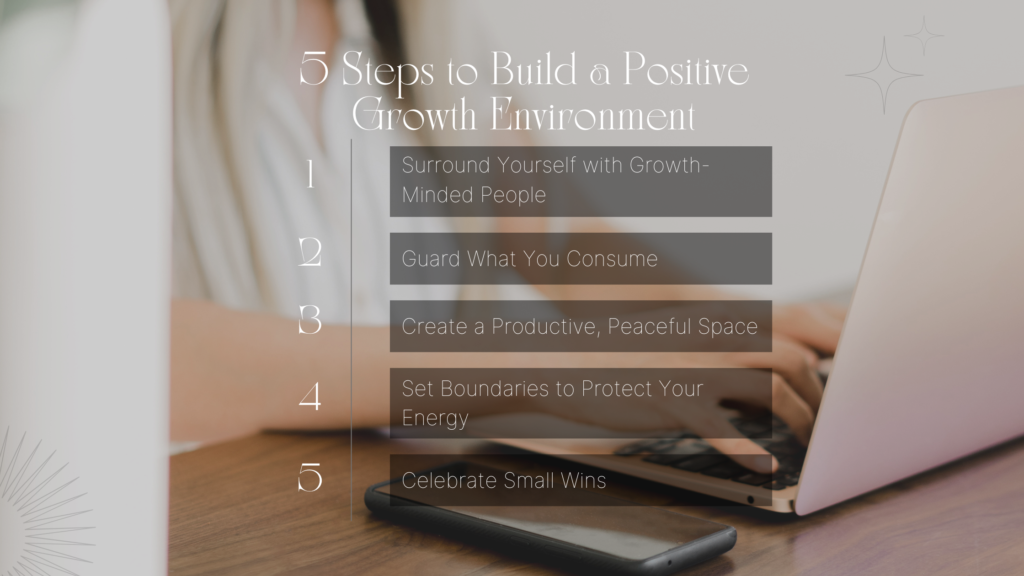The power of relationships, mindset, and surroundings all play a role in determining how far you can go in your journey towards self-improvement. To truly thrive, it’s essential to actively shape your environment. Whether it’s your physical space, the people around you, or the content you consume, you have the ability to cultivate an environment that nurtures your growth. Here’s how you can start creating positive relationships and spaces that set you up for success.
Surround Yourself with the Right People
Much like a plant needs the right soil, people need the right environment to flourish. You can create your environment; you don’t have to stay in a bad one. If you’re surrounded by people who are negative, unsupportive, or even toxic, it will eventually take a toll on your mental health and progress.
In contrast, positive, encouraging relationships can act as a springboard for growth. These people become accountability partners, mentors, and cheerleaders who motivate you to reach your goals. If you find yourself in an environment where negativity prevails, seek out mentors or friends who inspire you, and make an effort to build new, healthier connections. Don’t underestimate the power of online communities, podcasts, or even social media groups to provide support and inspiration.
Tip: Find an accountability partner who holds you responsible for your goals but also lifts you up when you’re struggling. Regular check-ins with someone who genuinely wants to see you succeed will help keep your momentum going.
Guard Your Input: Garbage In, Garbage Out
The information you feed your mind shapes your thoughts and, ultimately, your actions. There’s an old saying “garbage in, garbage out”, this still rings true. What you read, listen to, and watch can influence your mindset and mood. Be selective about what you allow into your life.
Instead of doom-scrolling through social media, consider following pages, podcasts, or people that offer uplifting, motivational content. When it comes to music, books, or TV shows, opt for those that leave you feeling energized, inspired, or peaceful.
Tip: Take stock of your media consumption habits. Are they helping or hurting you? Start replacing negative inputs with positive ones, whether it’s switching to podcasts that focus on personal development or listening to music that puts you in a better mood.
Organize Your Space for Peace and Productivity
Your physical environment plays a huge role in how you feel and how productive you are. I don’t know if you feel the same but I feel out of sorts when my home or workspace is chaotic. I can’t really enjoy and relax at home when I’m surrounded by chaos and surely I can’t focus on work when I see the mess around me. When your environment is cluttered or messy, it can create stress and anxiety, making it harder to focus on what matters.
On the other hand, organizing your surroundings can give you a sense of control and calm. Decluttering your workspace or tidying up your home can do wonders for your mental clarity and productivity.
Tip: Create a space that promotes focus and peace. If you’re struggling to work at home, explore options like co-working spaces, coffee shops, or libraries, which might provide a more productive environment.
Set Boundaries to Protect Your Energy
Sometimes, the people we interact with daily—whether they’re coworkers, family members, or friends—aren’t always the most supportive. While you can’t always remove yourself from these situations, you can establish boundaries that protect your mental health and energy.
Imagine your mind as your living room. Would you let just anyone come in and dump garbage all over it? Probably not! So why let people dump negativity or toxic behaviors into your mental space? Politely but firmly set boundaries with people who gossip, criticize, or bring you down.
Tip: Practice politely distancing yourself from negative conversations, whether it’s in the office or among friends. This could be as simple as changing the subject or directly saying, “I’d rather not discuss that.”
Celebrate the Small Wins
Positive relationships also involve celebrating the successes—big or small. Growth is a journey, and progress isn’t always linear. Make it a point to celebrate your wins, no matter how small they seem. By recognizing each step forward, you’ll stay motivated and keep your momentum alive.
Tip: Acknowledge even the smallest accomplishments by treating yourself to something special, sharing your success with a friend, or just taking a moment to appreciate how far you’ve come.
Leaders, Take Responsibility
For those in leadership positions, your role in creating a positive environment is important. Some leaders mistakenly manage people instead of leading them. True leadership means recognizing the unique potential in each team member and fostering an environment where they can grow and succeed.
A leader’s behavior sets the tone for the entire team. Whether you’re in charge of a large group or a small project, make it your responsibility to lead with empathy, encouragement, and clarity. A healthy environment leads to happier, more productive employees.
Tip: Whether you’re a leader or not, lead by example. Promote positive conversations, be transparent in your communication, and make sure everyone on your team feels valued.
Building Your Garden of Growth
To wrap up, cultivating a positive environment requires conscious effort. Like a garden, it needs nurturing and careful selection of the right “plants” (people, habits, inputs) to thrive. By surrounding yourself with positive influences, setting boundaries against negativity, and being mindful of your physical space, you can create an environment that supports your growth.
You can create a beautiful garden. Start planting the seeds today by choosing relationships, media, and spaces that nourish your well-being. With time and care, your personal garden will bloom.
Do you have tips or book recommendations on building a positive environment? Share them in the comments—I’d love to hear from you!

